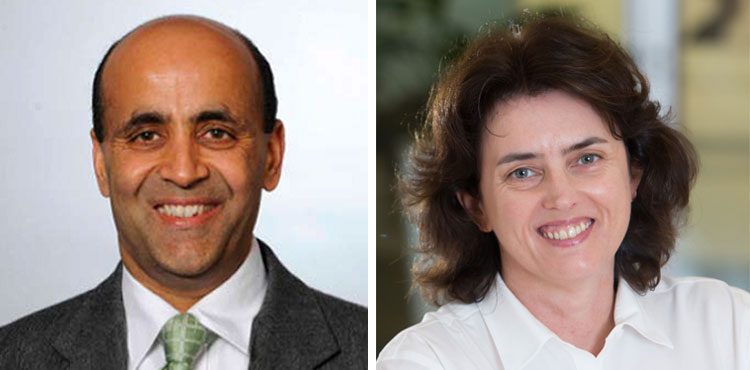
Funding success for our researchers
Professor Bala Venkatesh (left) and Associate Professor Meg Jardine (right)
Two George Institute researchers have just received funding from the Medical Research Futures Fund to further understanding into sepsis survival and improve outcomes for patients with chronic kidney disease.
Professor Bala Venkatesh has been awarded $275,000 for a Practitioner Fellowship into sepsis which kills around 5000 Australians every year, and up to half of those infected in low income countries.
Associate Professor Meg Jardine will use her grant of $476,000 to focus on improving cardiovascular outcomes for people with chronic kidney disease. Assoc Prof Jardine relinquished her recently awarded MRFF Trip fellowship to accept this MRFF Career Development Fellowship.
In total 21 researchers were recipients of the 2018 Medical Research Future Fund Next Generation Researchers fellowships.
The Hon Greg Hunt MP. Minister for Health made the announcement. He said: “These fellowships fund Australia’s next generation of clinical researchers to ensure the best and brightest minds are supported today to make the breakthroughs of tomorrow.”
More information on the projects:
Sepsis Outcomes Research – Professor Bala Venkatesh
Sepsis is a major cause of hospitalization and ICU admission in Australia population corresponding to more than 15,700 new cases each year. Every year more than 3,000 people die from sepsis in Australia which is greater than the annual national road toll and breast, prostate or colorectal cancer. The research outlined in this proposal to study the effect of steroids and vitamin D to improve patient's recovery from sepsis and also understand the genetic basis behind their ability to survive sepsis.
Understanding and optimising the delivery of chronic disease care for better cardiovascular outcomes – Associate Professor Meg Jardine
The proposed research program will undertake research that utilises existing clinical information and structures. This information will provide evidence in a cost effective manner. A particular project will examine current treatment delivered to people with chronic disease. A second project will embed a study of the optimum level of sodium exposure in dialysis within routine clinical practice. The outcome will be a cost-efficient study that will potentially lead to improve outcomes.



